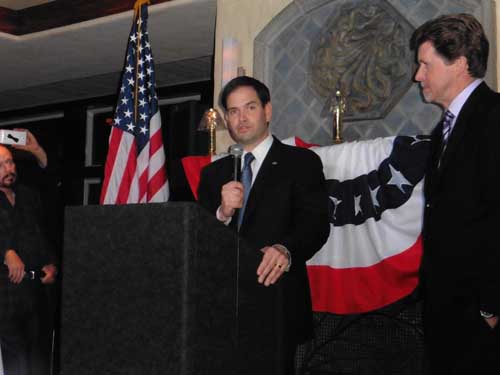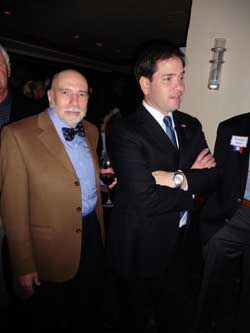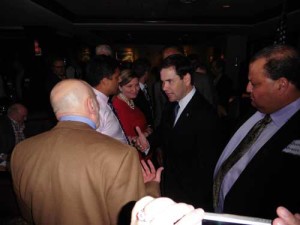
By Donald H. Harrison


LA JOLLA, California – U.S. Sen. Marco Rubio (R-Florida) criticized the Obama’s administration’s negotiation strategies toward Iran and Cuba; said conditions do not exist for the two-state solution sought by the administration for Israel and the Palestinian Authority, and called for giving returning military veterans college credits for what they learned while on duty.
The senator made these comments Tuesday evening, Jan. 27, in a 40-minute presentation, including questions and answers, to contributors to the Rubio Victory Committee, which divides proceeds from such events between his Senate campaign fund and his conservative Reclaim America PAC, which he set up to help elect other conservative candidates to office. Attendees contributed between $500 and $2,600 at the pre-dinner event, arranged by Karolyn and Debbie Dorsee of Dorsee Productions.
Although the senator frequently is mentioned as a potential Republican presidential or vice presidential candidate in 2016, he did not discuss either race from the podium set up in a dining room of the soon-to-be-opened Donovan’s Steak & Chophouse at 1250 Prospect Street in La Jolla Village. He had nearly an hour before his speech to work the crowd and respond to any private questions put to him about such intentions.

Florida has large concentrations of refugees and immigrants from Cuba, including the senator’s own working class parents, and it also has a sizeable population of Jews, many of whom are retired after living most of their lives in cities of the American Northeast. Rubio clearly had handled general questions about Israel and Cuba many times before.
Concerning Israel, the Florida Republican said: “Israel faces more challenges today than it has probably since the early days of its creation in the 1940’s. Let me describe the challenges: No. 1, Syria to its north is in complete disarray with large sectors of it under the control of the most radical, violent, most extreme jihadist element the world has ever seen. Across Europe we see this growing wave of anti-Semitism which is frightening, and not just across Europe, but in some sectors of academia in America as well. An all-out global effort to delegitimize the right of Israel to exist as a Jewish state in the international level. The constant pressure from this administration to cut a deal with the Palestinian Authority when the conditions do not exist for that deal at this time. And to top it all off a radical cleric in Iran that is moving full steam ahead to gather a nuclear weapon.”
Elaborating on Iran, he said:
I think it is important to understand that the Iranian people are a different story, the Iranian people by and large are not supportive of the government they have, but they have no choice. They are brutally oppressed. The Iranian government is not your traditional nation-state. We think of Iran as a country, but that is not how they think of themselves–the government. The leader of Iran is a radical cleric. He is not a king, he is not an emperor, he is not a president– he is a radical cleric. … You have to understand, you have to read their founding documents of the Islamic Republic; it says it very clearly. It does not say that the Supreme leader, the ayatollah, is the leader of Iran, it says that he is the leader of the Muslim world everywhere. He is a radical Shi’a cleric.
Here is what his theology says– he believes this, he sincerely believes this. He believes that the world is headed for a cataclysmic showdown between the Islamic and the non-Islamic world, and that it is his obligation to bring about that cataclysmic showdown because when he brings that about, the 13th Imam–the hidden Mahdi will emerge to unite the whole world under the banner of his form of Islam and establish a global caliphate. He believes it is his obligation to make that happen. He sees himself as a temporary fill-in for this hidden imam who is going to emerge.
So when a country — when a leader who says I want there to be a global, apocalyptic, cataclysmic showdown with the West is trying to acquire a nuclear weapon, not only does Israel have a right to be concerned, we have a reason to be concerned.
Now what do you need for a nuclear weapons program? You need three things. A delivery system– you need a missile to be able to deliver it; a weapon design; and the ability to enrich uranium or re-processed plutonium. They are going full steam ahead in their rocket technology. All these negotiations going on have nothing to do with the rocket system; they are still investing in that. The weapon design you can buy it. There are 15 scientists in Pakistan that will sell you one. And the third, about enrichment, they already have the capability of enriching; they are already enriching.
And they love these negotiations because look how these negotiations have gone. In 2003, the world said you are not allowed to enrich at all. Then the world said you are allowed to enrich but less than 20 percent. Then the world said okay you can enrich at 20 percent but you have to ship it overseas. Now they are saying okay you can enrich it at 20 percent and keep it in Iran but only in your research reactor. At the pace we are going, in about five years, we’re going to say, hey we’ll build the bomb for you.
So that’s my problem: we are negotiating with a leader that clearly wants a nuclear weapon for the purpose he has outlined. We should never allow it to happen, and his first target is Israel; they have been blunt about what they intend to do. That is a very serious risk.
On Cuba, Rubio said the idea is naïve that American capitalism will somehow democratize that communist nation. He said capitalism hasn’t changed China, Vietnam nor Burma into democracies, and in Cuba “there are no (private) businesses… If you want to open a restaurant in Cuba, you don’t own the restaurant. They (the government) own the land and they are your majority partner, and the workers at the restaurant work for the Cuban government, not for you. The only business in Cuba is the Cuban military. And of course they want more travel and remittances and more people going to Cuba; that means more money for them.”
As for Cuba releasing prisoners in exchange for the America relaxing its embargo, Rubio said:
It was a bad deal. Here was the deal. We gave them more travel, more telecommunications, banking, more remittances– basically everything they have asked for. In exchange Cuba agreed to release 53 political prisoners. … Of the 53 political prisoners that were released, 14 of them had already been released because they had already completed their sentences. One of them was released a year ago. Five of the 53 have already been rearrested. Since Dec. 17th when Obama signed the deal, of the 53 that were released, and 5 rearrested; 200 additional people have already been arrested in Cuba, and last year alone 8,000 people were arrested in Cuba. Fifty-three is not an impressive number when you put it up against 8000. That’s the kind of deal you get when you send a speech writer to negotiate with the top intelligence officials on the island of Cuba!
During his speech, Rubio called for retooling the American education system to make it better suited for the global economy. He said certain old educational models need to be scrapped, especially the idea that the only way one can earn college credits or job certifications is by taking traditional classes.
He made a well-received plea for military veterans, saying “if you served your nation in the military and part of your service was driving a truck through the dangerous road of Afghanistan, avoiding IED’s and mine fields and things of this nature; if you have been doing that, trucking high-level explosives on the dangerous roads in Afghanistan, there is no reason why we shouldn’t allow you to transport eggs on the Interstate Highway system of the United States.
“If you have served in the United States Armed Forces in the Middle East for two or three years, we should not force you to pay $2,000 to take a course on Middle Eastern affairs. People should get credit for what they already know and they should be able to package learning no matter where they acquired it.
“You should be able to go in somewhere and be able to say to them: “I have taken 30 college credit hours in a regular school; I have taken all these online courses that are available for free from some of the most prestigious universities; I’ve served four years in the military; I have seven years of work experience, and someone should be able to take that entire portfolio of what you know and what you’ve learned and give you the equivalent of a college degree so you can find a job and don’t have to pay tens of thousands of dollars for it!”
*
Harrison is editor of San Diego Jewish World. Your comment may be posted in the space provided below or sent to donald.harrison@sdjewishworld.com